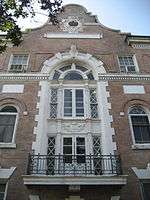Paul Tulane
| Paul Tulane | |
|---|---|
 | |
| Born |
May 10, 1801 Cedar Grove, Princeton, New Jersey |
| Died |
March 27, 1887 (aged 85) Princeton, New Jersey |
| Resting place |
Princeton Cemetery 40°21′09.8″N 74°39′38.0″W / 40.352722°N 74.660556°W |
| Nationality | American |
| Occupation | Retail, Real estate, Philanthropist |
| Years active | 1822–1857 (business) |
| Known for | Founding Tulane University |
Paul Tulane (May 10, 1801 – March 27, 1887), was an American philanthropist, born near Princeton, New Jersey, the son of Louis Tulane, a French immigrant, and Maria Tulane. He was educated in private schools, including Somerville Academy of New Jersey, until he was fifteen years of age. He clerked briefly in a store in Princeton and thereafter spent three years touring the southern United States with a well-educated male cousin, who was a member of the bar in France. It was from this tour that Tulane developed a keen interest in New Orleans.
In 1822, he established Paul Tulane and Co. in New Orleans, a retail and wholesale dry goods and clothing business. Later, he invested in real estate in both New Orleans and New Jersey. By 1828, he had amassed a fortune of over $150,000. His business operated for nearly 40 years. He retired with a large fortune in 1857. About this time he bought the John P. Stockton home in Princeton, now known as the Walter Lowrie House, where he subsequently resided. During the American Civil War, Tulane was the largest donor in New Orleans to the Confederate States of America, but the historian John D. Winters in his Civil War in Louisiana (1963) does not give the amount Tulane contributed.[1]
For many years he gave liberally to the charitable institutions and Presbyterian churches of Princeton and New Orleans. In 1882, he donated $363,000 (1882 value) to improve higher education in the city of New Orleans. Tulane's Act of Donation ultimately resulted in the renaming of the University of Louisiana (founded as the Medical College of Louisiana) to The Tulane University of Louisiana, in his honor and turning the once public institution into a private one, the only such instance in United States history. He died near Princeton, and is buried in the Princeton Cemetery on Witherspoon Street. In his honor, he has several streets named after him throughout the country, including Tulane Street in Princeton, and Tulane Avenue in New Orleans.
References
- ↑ John D. Winters, The Civil War in Louisiana, Baton Rouge: Louisiana State University Press, 1963, ISBN 0-8071-0834-0, p. 39
Sources
- Collier's New Encyclopedia (1921).
- "Paul Tulane," A Dictionary of Louisiana Biography, Vol. 2 (1988), pp. 799–800.
- John P. Dyer, Tulane: The Biography of a University, 1834-1965 (1966).
- John Smith Kendall, "Paul Tulane," Louisiana Historical Quarterly, XX (1937).
- Dumas Malone, ed., Dictionary of American Biography.
| Wikimedia Commons has media related to Paul Tulane. |
